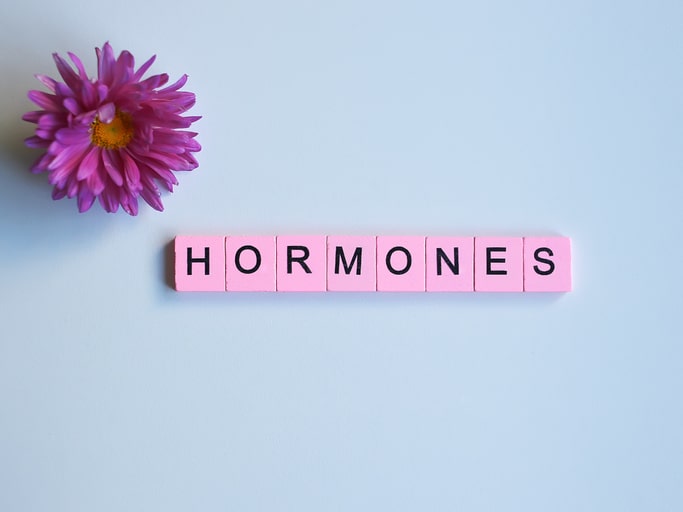Learn What Foods to Eat to Balance Your Hormones
Ugh, there is nothing worse than feeling like your body is fighting you. None of your clothes feel right. You’re hot and then you’re cold. You can’t sleep but you’re exhausted. And you’re cranky. Yes, like you I know exactly what this feels like.
It’s the hormones. Yes, you can blame this on the hormones! A hormonal imbalance causes chaos in your body – impacting your physical and mental health. The fantastic news is, you can make changes to your daily routine and diet to help fix a hormonal imbalance.
So don’t stress – smile because you know you’ll be back in your favorite jeans and tops in no time. In this blog I explain the facts on your hormones, hormonal imbalances, the 12 signs of a hormonal imbalance, and the foods you can eat to balance your hormones naturally.
I know a lot of you have questions about hormones, perimenopause, menopause, belly fat, and your body. To get all of my insider tips and advice on how to live your healthiest and best life, subscribe to my mailing list. And make sure you join the JJ Smith Facebook Community page to connect with people like you who want to take control of their hormones.
8 Facts You Need to Know About Your Hormones
No one really wants to talk about hormones. It’s likely your doctor hasn’t even discussed your hormones and how they affect your daily life. Well, it’s time to change this.
I want you to know these 8 facts about your hormones:
- Hormones are specialized chemical substancessubstance in the body, controlling and regulating the activities of other cells and organs.
- Your hormones send messages to regulate every process in your body.
- Your hormones impact your appetite, heart rate, sleep cycles, reproductive cycles, sexual function, metabolism, mood, and body temperature.
- Men and women have the same hormones. But the amount, how they are produced, and how they interact with other organs and body systems differs.
- Your liver has a key role in keeping your thyroid, adrenal, cortisone, and sex hormones (estrogen, progesterone, and testosterone) balanced.
- There are over 200 hormones circulating in your bloodstream.
- Every hormone, organ, and internal process is connected, so when one hormone is out of balance, you feel the impacts.
- Hormonal belly is real! “Hormones help regulate many bodily functions, including metabolism, stress, hunger, and sex drive. If a person has a deficiency in certain hormones, it may result in weight gain around the abdomen, which is known as hormonal belly.”
6 Hormones Every Women Needs to Know About
You need to know about your body and how it works.! And this includes understanding how your hormones impact your mood, your weight, and every other aspect of your physical and mental health.
While we can’t talk about every single hormone, I do want to highlight these 6 key hormones:
- Leptin is released by your fat cells and is responsible for telling your brain when you’re full and to stop eating or drinking. In fact, leptin is the reason why so many people experience post-diet weight gain.I really like the way the Society for Endocrinology explains leptin, “Leptin does not affect food intake from meal to meal but, instead, acts to alter food intake and control energy expenditure over the long term. Leptin has a more profound effect when we lose weight and levels of the hormone fall. This stimulates a huge appetiteappetited and increased food intake. The hormone helps us to maintain our normal weight and unfortunately for dieters, makes it hard to lose those extra pounds!”.
- Thyroid hormones impact your metabolism – speeding it up or slowing it down. When your thyroid is underactive, your thyroid gland does not generate enough thyroid hormone. This underactivity causes your metabolism to slow down and can contribute to unexplained weight gain around your belly.
- Estrogen is responsible for reproduction, menstruation, menopause, and your body fat levels. Women and men have estrogen, but it is much higher in women.Your estrogen levels fluctuate during perimenopause and when you reach menopause, you stop producing estrogen. This lack of estrogen has direct impacts on your metabolism, muscle mass, and how your body looks and feels. Your estrogen levels affect where you store body fat.
- Testosterone is often overlooked by women and is thought of as the male hormone. While testosterone is the male sex hormone, women also have testosterone. In women, testosterone has a critical role in building strong bones and muscles.
- Cortisol is your fight or flight hormone. Your cortisol levels are controlled by your stress levels. The more stressed you are, the higher your cortisol levels. A high cortisol level tells your body to be ready for a fight or survival, tricking your body into storing extra body fat – in the event you can’t get food. This extra body fat is typically stored around your belly, in your breasts, and on your face.
- Insulin is secreted by your pancreas and converts the sugar in the foods you eat into energy. When your insulin is consistently too high or spikes, your body responds by converting excess sugar and glucose into fat.
Now, I know this is a lot of information to take in. Don’t worry – you don’t need to be an expert in hormones and your health. This is why I write and share these blogs with you – to give you the information you need to understand how your body works.
What is an Hormonal Imbalance?
A hormonal imbalance is when there is too little or too much of a hormone circulating in your bloodstream. It doesn’t take much to create a hormonal imbalance and trigger a range of symptoms and side effects.
A hormonal imbalance can be responsible for a range of concerns including weight gain, low energy levels, fluctuating moods, trouble sleeping, and itchy skin.
This quote from Endocrine Web really stands out for me: “When your hormones are balanced and working in sync, you won’t notice them, of course, and that’s a good thing. It’s when they’re imbalanced that you could start seeing cascading health issues take over.”
12 Signs of Hormonal Imbalance
There are over 200 hormones in your body working hard to keep you feeling and looking healthy and well. Because there are so many hormones, there is a wide range of hormonal imbalance signs.
Endocrine Web has an excellent list of hormonal imbalance signs that I want you to know. Please pay attention to any new or unexplained changes in your health and wellness:
- Sudden or inexplicable weight gain or weight loss.
- Difficulty sleeping.
- Feeling very hot or very cold changes, or extreme sensitivity to heat or cold.
- Excessive sweating.
- Heart rate changes.
- Dry skin or sudden acne.
- Anxiety or other mood changes.
- Sexual function or sexual appetite shifts.
- Blurred vision.
- Brittle hair and nails.
- Excessive hair growth.
- Breast tenderness.
Please do not ignore these or any other symptoms. These signs and symptoms can be linked to serious health conditions – talk to your doctor.
How to Eat to Balance Your Hormones Naturally
It’s no secret that you are what you eat! And the foods you eat do impact your hormonal health.
Thanks to scientific research we know a lot about how food impacts your hormonal health. Here’s a short sample of some of the studies and findings into food and hormonal imbalances:
- Research into diets high in sugar and highly refined carbohydrates highlights how these stimulate insulin resistance and can lead to type 2 diabetes and other health issues.
- Eating enough protein is linked to helping control appetite and producing hormones that help you feel full. Consuming 20 – 30 grams of protein with every meal can help you burn fat and also build more muscle..
- Too many people are afraid of eating fat. But you need to eat healthy fat to help regulate your insulin levels and the levels of hormones that help you feel full.
So, with this in mind, let’s talk about the foods that can help you balance your hormones naturally. Not only are the 4 foods on this list healthy and delicious, but they also have deep-ranging health impacts beyond your hormone health.
The next time you go grocery shopping, try to put at least two of these foods in your cart and experiment with ways to prepare and eat these hormonal balancing foods:
- Cruciferous vegetables. Vegetables like broccoli, Brussels sprouts, cabbage, bok choy, cauliflower, and broccoli sprouts are both liver and hormone health superfoods. These foods help your liver metabolize and manage estrogen. Try adding these to a soup, a stir fry, a salad, or even in your morning smoothies.
- Food high in omega-3 fats. Salmon, walnuts, flaxseed, olive oil, avocados, chia seeds, and canned albacore tuna are rich sources of omega-3 fatty acids. When you choose these healthful fat sources, you’re getting the ideal balance of fatty acids while keeping saturated and trans fat to a minimum. As an extra bonus, these foods are excellent sources of protein.“The good fats in fish improve overall hormonal communication. The endocrine system uses hormones to communicate with the brain, which in turn boosts our mood and gives us better cognitive skills,” says Carrie Gabriel M.S., RDN, a dietitian and owner of Steps2Nutrition.
- Brightly colored fruit. I want you to eat the rainbow! Load up your cart with oranges, berries, lemons, melons, bananas, apples, pears, grapes, and any other favorites. Fruit is an ideal way to help curb a sweet tooth, get the vitamins you need, are rich in powerful antioxidants, high in fiber, and can help lower inflammation – all of which impacts your ability to regulate and produce the right hormone levels.
- Healthy carbohydrates. You know that fast-acting carbohydrates can wreak havoc on your blood sugar levels. Well, when this happens, your insulin level is impacted – causing you to store extra energy as fat. But when you eat healthy carbohydrates such as beans, wild rice, large flake oats, quinoa, whole grain bread, or buckwheat – you get long-lasting energy that doesn’t cause your blood sugar levels to spike. Think slow-acting carbohydrates for insulin and cortisol balance.Swap white bread for a whole-grain seedy loaf. Swap white rice and pasta for wild rice. Swap your morning cereal for a bowl of overnight oats topped with fresh berries. Swap white potatoes for sweet potatoes
As an extra bonus these foods are liver superfoods! So, when you eat a diet rich in greens, fruits, healthy carbohydrates, and omega-3 fats – you’re eating the foods that help you naturally balance your hormones while supporting your liver health. And the really big bonus is, these foods all contribute to keeping your blood sugar levels in check.
Food really does impact every aspect of your physical and mental health. I want you to enjoy the foods you eat. These foods help you feel great, get and stay healthy, and help you slip into your favorite skinny jeans.
Your Hormone Health is in Your Hands
No one wants to talk about hormones, periods, or menopause – but it’s time to change this! So, let’s get talking!
Join the JJ Smith Facebook Community page to chat with other women like you who want real talk about hormonal imbalances, periods, perimenopause, estrogen dominance, and menopause – let’s get the conversations going!
And remember to read my other blogs about hormone health and to subscribe to my mailing list. I want you to know what I know about hormones, health, weight gain, belly fat, and balancing your hormones naturally.
Congratulations for taking charge of your health!


